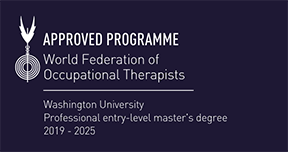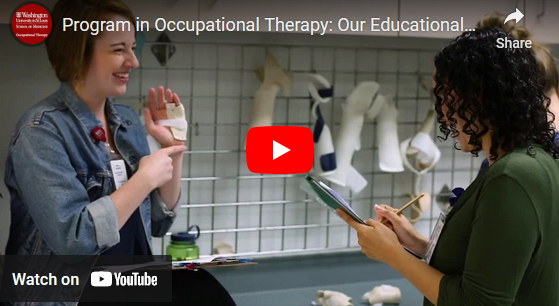| Important message regarding admission requirements: Because of the restrictions and precautions that occurred at OT-related experience and observation sites during COVID-19, we continue to provide additional options for prospective students to strengthen their application. Click here to learn more about these opportunities. |
Master of Science in Occupational Therapy
The MSOT degree prepares generalist clinicians with the knowledge and skills to work as direct care providers, consultants, educators, managers and advocates for clients.
Our curriculum trains practitioners to develop their unique occupational lens. Curricular threads intersect and overlap so that each student engages with their coursework in a personalized way. Students learn how to select and use appropriate theories, models of practice, and frames of reference to guide the occupational therapy evaluation and intervention process. They are able to evaluate and apply research literature and evidence to support practice. Students develop professional behaviors that are consistent with the occupational therapy code of ethics, governmental requirements, professional standards and institutional policies. Click here to view the MSOT curriculum grid.
Graduates enter practice with the following competencies to:
- Use evidence to inform occupational therapy assessment and intervention across the continuum of care
- Develop community programming
- Exercise sound, professional judgement and clinical reasoning
- Value and encourage interprofessional collaboration
- Promote an inclusive culture of humility and sensitivity
- Use current technologies and informatics
 For students interested in pursuing a PhD in the future, the MSOT degree program also includes the option for students to study with faculty scientists. Students have exposure to topics in participation, public health, aging, children and youth, mental health, work and industry, and neurorehabilitation.
For students interested in pursuing a PhD in the future, the MSOT degree program also includes the option for students to study with faculty scientists. Students have exposure to topics in participation, public health, aging, children and youth, mental health, work and industry, and neurorehabilitation.
An experiential portion of the curriculum — six months of full-time fieldwork supervised by experienced clinicians — follows the two years of academic coursework for a total of 80 credit hours. The MSOT degree program is a 28-month, full-time program.
With the MSOT degree, you will be eligible to sit for the NBCOT examination to become a practicing occupational therapist. The exam is administered by the National Board for Certification in Occupational Therapy (NBCOT), located at One Bank Street, Suite 300, Gaithersburg, MD 20878. NBCOT’s phone number is (301) 990-7979 and its web address is www.nbcot.org. See our NBCOT Pass Rate.
A felony conviction may affect a graduate’s ability to sit for the NBCOT certification exam or attain state licensure.

| Important message regarding admission requirements: Due to COVID-19 restrictions and precautions at OT-related experience and observation sites, we are providing alternate options for prospective students to fulfill requirements. Click here to learn more about these opportunities. |
Admission Requirements
Applicants must possess personal qualities of character, integrity and motivation, as well as the capacity to perform essential functions suitable for a career in occupational therapy. All applicants must successfully pass a drug screening, criminal background check, and family and child services review. The admissions committee takes the following factors into consideration:
1. Undergraduate education
A baccalaureate degree from an accredited college/university or enrollment in an affiliated 3-2 program and satisfactory completion of all prerequisite coursework. Prerequisite courses can be taken online or outside of the degree-granting school, as long as they are from an accredited institution. Advanced placement (AP) courses and test scores do not count for prerequisites. The following six prerequisite courses (3 semester hours each or equivalent if on quarter system) must be completed with grades of B or better and at least four of the six courses must be complete at time of application:
- Abnormal Psychology
- An abnormal psychology or a psychopathology course fulfills this requirement.
- Developmental Psychology
- You may choose a child development or a lifespan course that includes learning principles and motor, language, cognitive, emotional and social development.
- Life Science
- Must be 200 level or above; no lab is required. Suggested courses include but are not limited to human anatomy, neuroanatomy, comparative anatomy, pathophysiology, zoology, genetics, botany, ecology and cognitive neuroscience.
- Physiology
- Must cover the organization of cells into tissues, organs and organ systems in humans. A course titled “Anatomy and Physiology” is acceptable; however, if the course is part of a two-part sequence, both courses must be completed to be able to fulfill prerequisites. One part can fulfill the life science prerequisite, with the second part for the physiology prerequisite.
- Social Science
- Suggested courses include, but are not limited to, other psychology courses, sociology, anthropology, economics, political science, public health, epidemiology, gerontology and urban studies.
- Statistics
- You may choose behavioral, educational, psychological or mathematical statistics. Business statistics does not fulfill this requirement.
2. Pre-requisite and cumulative GPA
A grade of B or better is required for all pre-requisite courses, and a 3.25 cumulative GPA is required for the MSOT and OTD programs.
3. Recommendations
Three letters of recommendation are required from:
- A professor, teacher or academic advisor.
- A person who can speak to your clinical potential, such as someone who supervised you during an OT-related experience or worked with you in a setting related to health care or populations related to OT.
- A person of your choice, other than a relative or family friend, who can speak objectively about your strengths. A work supervisor or another teacher is recommended.
4. OT-related experience
A minimum of 30 in-person hours of occupational therapy-related experience or observation is required. We encourage applicants to visit different sites to experience the diversity of the OT practice. Activities such as volunteering as a camp counselor for children with disabilities or working as an aide at an assisted living facility count toward this requirement as they provide exposure to populations that interface with OT. It is strongly recommended, but not required, that a portion of the hours include observation with one or more occupational therapists. We also encourage you to supplement these types of experiences with non-traditional OT-related hours, which could include written reflection on books, podcasts, movies, website and alumni interviews, etc. Explore these resources and see this page for more details on how to document. Explore these resources and see this page for more details on how to document.
5. Understanding of OT and strong writing skills
Applicant should answer the personal statement prompt provided by OTCAS. The statement should reflect knowledge of OT as gained through observations and other experiences, as well as strong writing skills and articulation of goals for the future. There is no set word minimum or maximum.
6. Life experience
Participation and leadership in extracurricular activities, work, research or other pursuits is encouraged. Please complete the portions of the OTCAS application regarding extracurricular experience fully even if you mention activities in other places, such as your personal statement.
7. Video interview
Following the processing of your application, you will receive an email from the Program in Occupational Therapy with a link to complete a three-question, asynchronous video interview. The questions are designed to better understand your interpersonal and problem-solving skills.
8. International students
TOEFL (and TWE, if Paper-Based Test) should be taken no more than one year prior to application. Transcripts from universities outside the United States must be reviewed by a credentialing agency. Click here for more information.

Estimated Cost of Attendance
| Current Cost |
MSOT Program 2024 Fall Semester |
MSOT Program 2025 Spring Semester |
MSOT Program |
Total Cost of Program (2-year program 2024-2026) |
| Tuition | $18,333 | $18,333 | $54,999 | $110,000 |
| Student Fees |
$0 | $0 | $0 | $0 |
| Books and Supplies |
$800 | $950 | $1,850 | $3,100 |
| Loan Fees |
4.228% Grad (PLUS) 1.057% (Unsub) |
4.228% Grad (PLUS) 1.057% (Unsub) |
4.228% Grad (PLUS) 1.057% (Unsub) |
4.228% Grad (PLUS) 1.057% (Unsub) |
| Distance Ed Fees |
$0 | $0 | $0 | $0 |
| Total | $19,133 |
$19,283 |
$56,849 |
$113,100 |

How to Apply
Washington University participates in AOTA’s centralized application system for occupational therapy educational programs, OTCAS. Students manage their applications online and may apply to more than one school at a time. Washington University does not require a separate application or fee.
The Program admits one class each year in the fall. Applicants begin the admission process during the preceding fall and must complete all required elements by the Dec. 1 (early admission) or Jan. 30 (regular admission) deadlines.
The application process is as follows:
- The OTCAS system is open for applications in July 2023 for those applying for admission to the fall 2024.
- Your application, official transcripts and three letters of recommendation must be submitted to OTCAS by Dec. 1 (early admission) or Jan. 30 (regular admission).
- Once completed, “OTCAS applications are processed on a first-come, first-served basis.” Click here for OTCAS frequently asked questions about the deadline. In our experience, it can take two to four weeks before an application is verified by OTCAS and released to us for review.
- Once completed OTCAS applications are released to us, they are reviewed in the order in which they are received.
- Applicants are encouraged to complete the application process well in advance of the deadline. Decision notices for early applications will be sent out by Dec. 20 and must be accepted or declined by Jan. 20. Decision notices for regular applications will be sent out by Feb. 20 and must be accepted or declined by Mar. 20.
| PLEASE NOTE: Applicants will have until 11:59 p.m. Eastern Standard Time (EST) on Dec. 1 or Jan. 30 to submit to OTCAS, not from any other time zone from which your application may be sent. The portal will close at 12:00 a.m. EST on Dec. 2 and Feb. 1, and you will not be able to submit your application. These are hard deadlines set by the Program and OTCAS, so please plan accordingly. |
Washington University encourages and gives full consideration to all applicants for admission, financial aid and employment.
Washington University - Non-Discrimination Statement
The School of Medicine is committed to recruiting, enrolling and educating a diverse student body.
The Program in Occupational Therapy is accredited by the Accreditation Council for Occupational Therapy Education (ACOTE) of the American Occupational Therapy Association (AOTA), located at 6116 Executive Boulevard, Suite 200, North Bethesda, MD 20852-4929. ACOTE’s telephone number, c/o AOTA, is (301) 652-6611 and its web address is www.acoteonline.org.
With the MSOT or OTD degree, graduates are eligible to sit for the NBCOT examination to become a practicing occupational therapist. The exam is administered by the National Board for Certification in Occupational Therapy (NBCOT), located at One Bank Street, Suite 300, Gaithersburg, MD 20878. NBCOT’s phone number is (301) 990-7979 and its web address is www.nbcot.org. See our NBCOT Pass Rate. A felony conviction may affect a graduate’s ability to sit for the NBCOT certification exam or attain state licensure.
The Program in Occupational Therapy has determined that, as a result of its ACOTE accreditation, its MSOT and OTD program curricula meets the educational requirements to sit for the NBCOT examination and to pursue licensure and certification in all states and territories of the United States and Washington, D.C.



